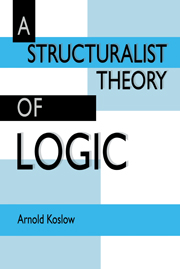Crossref Citations
This Book has been
cited by the following publications. This list is generated based on data provided by Crossref.
Pollard, Stephen
1998.
Homeomorphism and the Equivalence of Logical Systems.
Notre Dame Journal of Formal Logic,
Vol. 39,
Issue. 3,
Humberstone, Lloyd
2000.
The Revival of Rejective Negation.
Journal of Philosophical Logic,
Vol. 29,
Issue. 4,
p.
331.
Humberstone, Lloyd
2001.
The Pleasures of Anticipation: Enriching Intuitionistic Logic.
Journal of Philosophical Logic,
Vol. 30,
Issue. 5,
p.
395.
2003.
Anaphora.
p.
264.
Koslow, Arnold
2004.
Laws and Possibilities.
Philosophy of Science,
Vol. 71,
Issue. 5,
p.
719.
Humberstone, Lloyd
2005.
Logica Universalis.
p.
207.
Peregrin, Jaroslav
2006.
Meaning as an Inferential Role.
Erkenntnis,
Vol. 64,
Issue. 1,
p.
1.
Humberstone, Lloyd
2007.
Logica Universalis.
p.
225.
Peregrin, Jaroslav
2008.
What is the Logic of Inference?.
Studia Logica,
Vol. 88,
Issue. 2,
p.
263.
Azzouni, Jody
2009.
Why Do Informal Proofs Conform to Formal Norms?.
Foundations of Science,
Vol. 14,
Issue. 1-2,
p.
9.
Peregrin, Jaroslav
2010.
Logic and Natural Selection.
Logica Universalis,
Vol. 4,
Issue. 2,
p.
207.
Gaines, Brian R.
2011.
Knowledge capture through the millennia.
p.
1.
Jansana, Ramon
2012.
Universal Logic: An Anthology.
p.
251.
Moretti, Alessio
2012.
Why the Logical Hexagon?.
Logica Universalis,
Vol. 6,
Issue. 1-2,
p.
69.
Smessaert, Hans
and
Demey, Lorenz
2014.
Logical Geometries and Information in the Square of Oppositions.
Journal of Logic, Language and Information,
Vol. 23,
Issue. 4,
p.
527.
Trafford, James
2015.
Duality and Inferential Semantics.
Axiomathes,
Vol. 25,
Issue. 4,
p.
495.
Peregrin, Jaroslav
2015.
Logic Reduced To Bare (Proof-Theoretical) Bones.
Journal of Logic, Language and Information,
Vol. 24,
Issue. 2,
p.
193.
Torza, Alessandro
2015.
Speaking of Essence:.
The Philosophical Quarterly,
Vol. 65,
Issue. 261,
p.
754.
Koslow, Arnold
2015.
Quantifiers, Quantifiers, and Quantifiers: Themes in Logic, Metaphysics, and Language.
Vol. 373,
Issue. ,
p.
31.
Gaines, Brian R.
2015.
The Road to Universal Logic.
p.
145.



